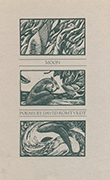Moon
Reviews | Purchase
In 1984, when Moon was published, the people of the world faced daily the possibility
annihilation in a nuclear holocaust. The Soviet Union and the United States, the two dominant
powers of the period, both possessed the weapons to destroy each other and the rest of the world many times over. Indeed,
they possessed weapons that could end forever the earth's capacity to support life. The most important taks facing all people
was the creation of a world free of nuclear weapons.
I hope that by the time you read this note, that task will be accomplished and my words here will seem a little ridiculous,
a little unreal. You will smile at this memory of fear and be shocked by the realization that nuclear weapons, so very
ridiculous and unreal, were once a part of everyday life. Then I ask you to discard this note and only read the poems as
expressions of the human heart.
But if, when you read this, we are still sitting on the edge of nuclear war, then you must not only read the poems and
expressions of the heart but you must also work to banish all nuclear weapons from the world. And one day to banish
all human suffering. Only this. - David Romtvedt
Samples
A Flower Whose Name I Do Not Know
Luminous three-foot leaves
float across an ocean of darkness,
a shimmering face with numberless eyes
that open and close.
The yellow sun, the black sky,
I can feel the tension
as each tries to erase the other.
The city clicks and hums
but the cloud overhead passes
as if over a fallow field.
The air is the same air
I breathed in Paradise
and Buchenwald.
A beautiful perfumed woman
enters the room. I want to stare
at her legs but her scent
is so strong it burns my nose.
I stand up to walk away.
As I open the door,
I am slapped in the face
by another world,
and it is this one.
Shine
I lie on the white snow with the white clouds
above my face. The wind blows through
the hairs in my nose. It pushes
the clouds in a parade of blurry shapes:
a frozen horse, a drunken saguaro,
a chewed-up bone, the face of a drowned man,
a charging lion. The clouds
disappear and there's only blue sky,
the same blue as the blue car
my father waxed once a month
even on the hottest Arizona days,
turning a soft rag in his hardened hands.
As he worked a drop of water would fall.
"Rain?" he'd hope. Then he'd lean over
the shining surface, see the sweat fall
from his face to the paint, and smile.
Reviews
From "Library Journal"
"When I was a boy the neighbor/ across the street built a bomb shelter." Romtvedt's work is at once personal and political, an awkward mix for most poets, but he manages to come down on issues and still keep himself and his experiences at the center of the poem. Besides the bomb, he addresses such contemporary topics as a "peace blockade," a nuclear accident in the Ukraine, and a Trident submarine jockeying for position in the Straits of Juan de Fuca near Bangor, Washington: "The air is the same air/ I breathed in Paradise/ and Buchenwald." Romtvedt travels from Hiroshima to Guatemala, from Zaire and Rwanda to Arkansas, collecting people and their stories. He is Everyman (and woman): His poems make it easy to recognize our common stake in world affairs. Highly recommended for anyone who reads poetry seriously.
- Louis McKee, Painted Bride Arts Ctr., Philadelphia
Copyright 1992 Reed Business Information, Inc.
